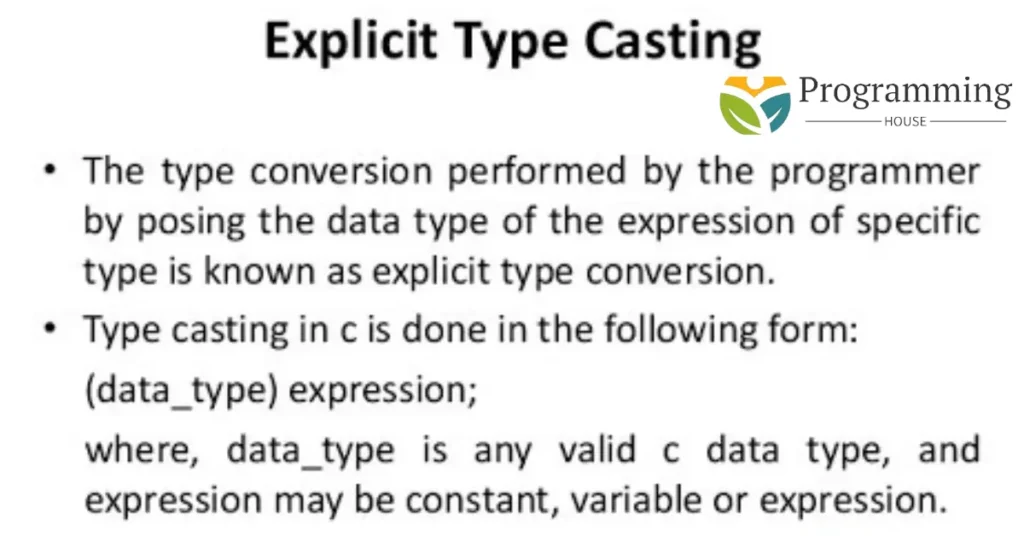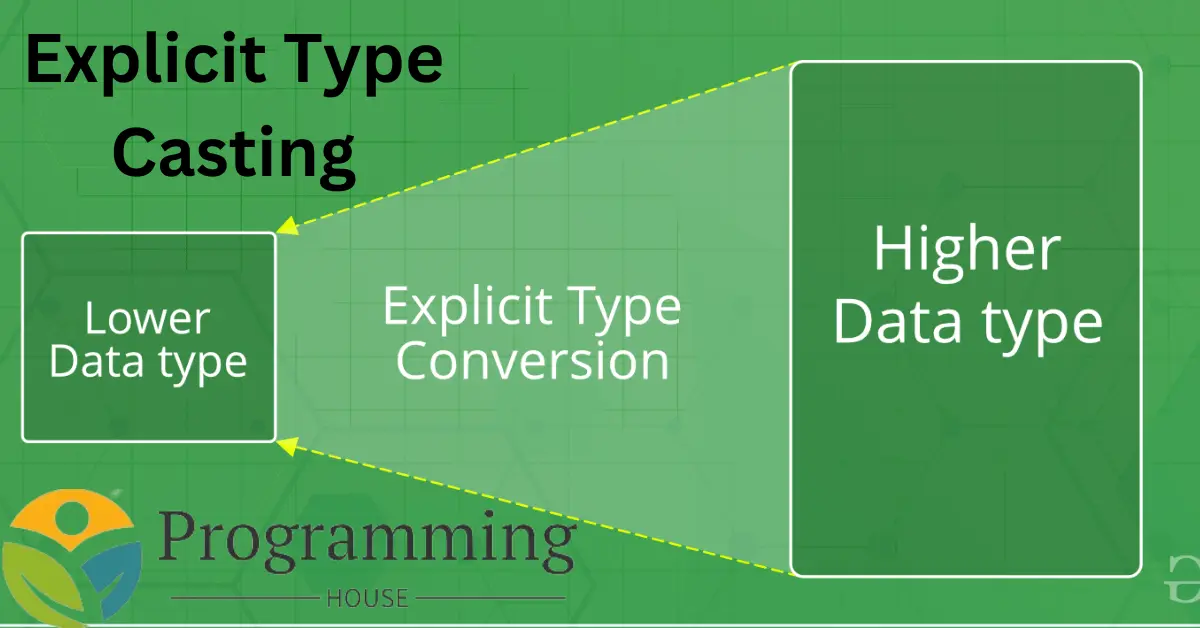Introduction of explicit type casting in C
Explicit type casting in C, often referred to as type conversion, allows programmers to convert a variable from one type to another intentionally. The programmer must specify the type conversion in explicit casting, unlike the implicit casting that is handled by the compiler automatically. I have more control over how data is interpreted and manipulated, ensuring that I perform operations correctly and as intended.

What is Explicit Type Casting?
Explicit type casting is the process of converting one data type into another by explicitly specifying the type to which you want to convert. Cast operators are used to convert . In C, you place the value to be cast inside parentheses of the target type for explicit casting.
Syntax
(target_type) expression
For example, if you want to convert a floating-point number to an integer, you can use the following syntax:
int x = (int) 3.14;
The example explicitly casts the float 3.14 to an integer, resulting in the value 3.
Why Use Explicit Type Casting?
Explicit casting is useful in various scenarios, including:
- Data Loss Control: When converting from a larger type to a smaller type (e.g., from
doubletoint), explicit casting makes it clear that potential data loss is intentional. - Type Compatibility: To ensure compatibility when performing operations involving different data types.
- Avoiding Warnings: To suppress compiler warnings about type mismatches.
- Interfacing with Libraries: When interacting with libraries or APIs that require specific data types.
Types of Explicit Type Casting
We can perform explicit type casting between various data types, such as
- Integer to Float and Vice Versa
- Character to Integer and Vice Versa
- Pointers to Other Pointer Types
- Numeric Conversions
Integer to Float and Vice Versa
When converting between integers and floating-point numbers, explicit casting is often necessary to prevent data loss or to ensure the correct type is used in calculations.
#include <stdio.h>
int main() {
int a = 10;
float b = 5.75;
// Convert int to float
float c = (float) a;
// Convert float to int
int d = (int) b;
printf("Integer to float: %f\n", c); // Output: 10.000000
printf("Float to integer: %d\n", d); // Output: 5
return 0;
}
This example demonstrates explicit casting. A float is converted from b, and a is converted from an int to a float.
Character to Integer and Vice Versa
Characters in C are represented as integers based on their ASCII codes. Explicit casting between char and int can be useful for various operations, such as encryption, encoding, and manipulation of character data.
#include <stdio.h>
int main() {
char ch = 'A';
int asciiValue = (int) ch;
char nextChar = (char) (asciiValue + 1);
printf("Character: %c\n", ch); // Output: A
printf("ASCII Value: %d\n", asciiValue); // Output: 65
printf("Next Character: %c\n", nextChar); // Output: B
return 0;
}
Characters in C are represented as integers based on their ASCII codes.
Pointers to Other Pointer Types
When dealing with pointers in C, we frequently use explicit casting to ensure the correct data type. This is particularly important when working with generic data structures or interfacing with different libraries. You must exercise caution to avoid undefined behavior.
#include <stdio.h>
int main() {
int num = 12345;
int *intPtr = #
void *voidPtr = (void *) intPtr; // Cast int pointer to void pointer
int *newIntPtr = (int *) voidPtr; // Cast void pointer back to int pointer
printf("Value: %d\n", *newIntPtr); // Output: 12345
return 0;
}
An integer pointer is cast to a void pointer and then back to an integer pointer in this example. This is common.
Numeric Conversions
Avin generic programming commonly uses void pointers to represent any data type.
#include <stdio.h>
int main() {
int a = 5, b = 2;
double result = (double) a / b; // Convert a to double before division
printf("Result: %f\n", result); // Output: 2.500000
return 0;
}
When dividing a number in this example, I explicitly convert a to a double before the operation to guarantee a floating-point result instead of an integer.
Potential Issues with Explicit Casting
While explicit casting provides greater control, it can also introduce potential issues if not used carefully:
- Data Loss: Converting from a larger type to a smaller type (e.g.,
doubletoint) can result in loss of precision or overflow. - Undefined Behavior: Improper casting of pointers, especially between incompatible types, can lead to undefined behavior and runtime errors.
- Code Clarity: Excessive casting can make code harder to read and understand, leading to maintenance challenges.
Best Practices for Using Explicit Type Casting
To avoid potential pitfalls, consider the following best practices when using explicit casting:
- Minimize Casting: Use explicit casting only when necessary. Avoid unnecessary casts that can clutter the code and introduce errors.
- Understand the Conversion: Ensure you understand the implications of the type conversion, particularly with respect to data loss and alignment.
- Use Descriptive Comments: When using explicit casting, provide comments to explain why the cast is necessary, improving code readability.
- Prefer Safer Alternatives: Where possible, use functions or mechanisms that ensure type safety without the need for explicit casting.
Conclusion
Explicit type casting in C is a powerful tool that allows programmers to convert data types deliberately and precisely. By understanding the rules and implications of explicit casting, you can ensure that your code performs correctly and efficiently, avoiding potential pitfalls such as data loss and undefined behavior. Remember to use explicit casting judiciously, provide clear comments, and test your code thoroughly to maintain readability, safety, and portability.
FAQs
Q1: What is the difference between implicit and explicit type casting?
Implicit type casting is automatically handled by the compiler without explicit instructions from the programmer. Explicit casting, on the other hand, requires the programmer to specify the type conversion using cast operators.
Q2: When should I use explicit type casting?
Use explicit casting when you need to convert a variable from one type to another deliberately, such as when dealing with mixed-type arithmetic, interfacing with libraries that require specific types, or ensuring type compatibility in function calls and assignments.
Q3: Is explicit type casting portable across different platforms?
When dealing with pointer casting and data types with different sizes and alignment requirements, it is necessary to exercise caution with explicit casting, as it is generally portable across different platforms.. Always consider the target platform and test your code accordingly.
Q4: How can I avoid errors when using explicit type casting?
To avoid errors when using explicit casting:
- Use it sparingly and only when necessary.
- Understand the implications of the conversion.
- Provide descriptive comments to explain the rationale for the cast.
- Test your code thoroughly, especially when dealing with pointer casting and numeric conversions.
Q5: What are some common use cases for explicit casting in C?
Common use cases:
- Performing arithmetic operations involving mixed data types.
- Interfacing with libraries or APIs that require specific data types.
- Manipulating character data using their ASCII values.
- Working with generic data structures and
voidpointers. - Ensuring type compatibility in function calls and assignments.



